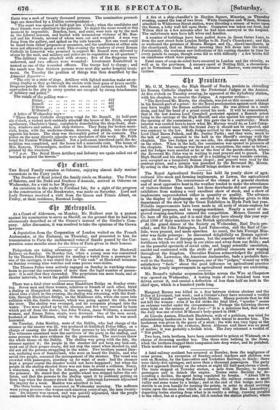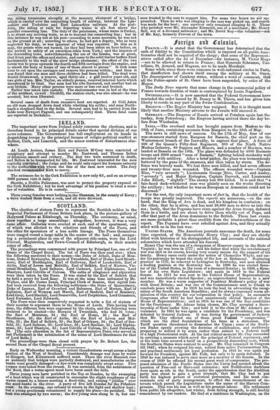tht Vrottfutro.
Mr. G. M. Murray, the High Sheriff of Bucks, persists in obtruding- ' his Roman Catholic chaplain on the Protestant Judges at the Assizes: At five o'clock on Tuesday evening, he appeared at the Aylesbury station, with his chaplain, to receive the Judges. A reporter writes— "The Reverend Mr. Morris, the chaplain, was not on this occasion adorned in his Romish garb of a priest : for the Royal proclamation against such things may have taught the Roman authorities care. He was attired in a court dress, and had the band of a priest round his neck. It will be remembered, that at the last Assizes Lord Campbell protested against a Romish priest being in the carriage of the High Sheriff, and also against his appearance at the opening of the commission ; and this gave rise to a controversy. Much interest was excited here to know what Mr. Hurray would do, as Lord Camp- bell, in an earnest tone, told the Grand Jury it should not be repeated, and was contrary to the law. Both Judges arrived by the same train,—namely„ Lord Chief Baron Pollock, and Mr. Justice Parke ; and they were, much to the talk of many, escorted to the hall in the Sheriffs carriage with the: - chaplain. The two Judges sat on one side, the chaplain and High Sheriff' on the other. When in the hall, the commission was opened in presence-of ; the chaplain. The carriage was then put in requisition, the same as before ; and the Judges were escorted as far as the door of the pariah-church, where - the Reverend Mr. Coles was in Waiting to read prayers and to preach. The High Sheriff and his chaplain rocle off to a.building.of very humble exterior, now occupied as a temporary Roman, chapel; and prayets were read by the resident priest, and.a sermem was preached _by the Reverend Mr. Morris. By acting in this way, the nigh aeriff brings Taattirs *to an issue."
The Royal Agricultural Society has h.eld its yearly show of agri- cultural live-stock and farming implements, at Lewes, the agricultural capital of Sussex. The concurrence of the climax of a general election and of most oppressive heat in the weather tended to make the attendance of visitors thinner than usual; but those drawbacks did not prevent the exhibitors from making a very excellent show of stock, and a show of implements unprecedented either in quantity or quality. The advance. - in the display of implementa is ascribed to the stimulus given to this department of the show by the Great Exhibition in- Hyde Park last year. Notable improvements have been made in all sorts of steam-engines for agricultural purposes, and in reaping-machines. " Nearly a score of im- proved reaping-machines entered the competition. Messrs. Garrett and Co. bore off the palm, and it is said that they have already this year sup- plied 1500 Of their machines to the British agriculturists. At the grand dinner of the Society on Wednesday, Earl Ducie pre- sided; and Sir John Pakington, Lord Palmerston, and the Earl of Car- lisle, were present, and made speeehes. As usual, the lath'Foreign Min- ister was facile princeps : he discoursed delightfully on Roman agricul- ture; on the value of foreign guano, but the superior value of the home fertilizers which we still keep in our cities and away from our fields - and. on the peaceful spectacle of social calm, and happy scientific emulation, amidst and contrasted with the strife of political elements now waging throughout the kingdom. Chevalier Bunsen acknowledged the political lesson. Mr. Lawrence, the American Ambassador, bade a probable fare- well to the Society. Mr. Thompson, one of the "judges," wound up with satisfactory ." facts " about the good influence on agriculturil practice which the yearly improvements in agricultural machinery are exercising.
— Mr. Bruners tubular suspension-bridge across the.Wye at Chepstow was, opened on Wednesday. A testing train of. two hundred tons was driven across it, and caused a- deflection of less than half an inch in the chief spfin, which is whundred yards long. • •
Margaret Barnes was killed in a fray between riotous electors and the Police at Liverpool, last week ; and a Coroner's Jury have returned a verdict- of "Wilful murder" against Constable Slaney. Blaney protests that he did not kill the woman : even if he did strike the fatal blow, " murder " seems an extreme verdict under the circumstances. Perhaps the following throws some light on the animus of the Jury—" It is a notorious fact, that one of the Jury was one of rebel M`Manue's body-guard in 1848."
At Lincoln Assizes, Elizabeth Blackburn, wife of a publican, was tried for administering laudanum to her husband, with intent to murder him. The laudanum was given in the gravy of a steak : the wife was very tipsy at the time. After hearing the evidence Baron Alderson said there was no proof of malice; it was probably a foolish trick. The Jury returned a verdict of "Not guilty."
Two boys, twin brothers, have been committed to prison at Wisbeach on a charge of drowning another boy. The three were bathing in the Nene when the brothers dragged their companion into deep water, and he perished. Their motive does not appear.
A fatal railway accident has occurred at Burnley, from the negligence of some person. An excursion of Sunday-school teachers and children was sent on Monday, by the Lancashire and Yorkshire Railway, to Goole; there were thirty-five carriages, and more than a thousand passengers. The party did not approach Burnley on the return at night till half-past eleven o'clock. rhe train stopped at Townley station, a mile from Burnley, to deposit passengers and to detach the engine. Trains enter Burnley by de- scending a decline, the speed being regulated by breaks. "About 120 to 150 yards before reaching the Burnley station, the railway crosses a small valley and some water by a bridge ; and at the end of this bridge next the station is an iron handle for turning the points, in order to shunt arriving trains upon the main line which is connected with the East Lancashire ; departing trains starting from what is in reality ,a siding, running parallel to the other, but at a gradual rise, till it reaches the flatten platform, where
the siding terminates abruptly at the masonry abutment of a bridge, which is carried over the connecting length of railway, between the Lan- cashire and Yorkshire and East Lancashire railways. At the plat- form, the siding or rails for departing trains is six feet above the parallel connecting line. The duty of the pointsman, whose name is Parker, is to shunt any arriving train, so as to descend the connecting line; but in this instance he was not at his post—according to some accounts, he was not on the ground at all; according to others, he had got a deputy, who in turn neglected his duty, or was ignorant of what was required. Be this as it may, the points were not turned, (as they had been about an hour before, on the arrival in safety of an excursion-train from York,) and the impetus of the descending train, notwithstanding the use of the breaks, was so great, that it ran past the offices and station, and came to the solid timber buffers fixed horizontally to the wall of the skew bridge abutment ; the effect of the two forces was to press upwards the fourth and fifth carriages from the engine, and to smash the body or frame of one of them almost to pieces." It took some time to cut open the carriages and remove the persona within; and then it was found that one man and three children had been killed. The dead were Daniel Greenwood, a weaver, aged thirty-six ; a girl twelve years old, and two girls of ten. Mrs. Taylor, an elderly person, received internal hurts which threatened to be fatal. One man had his ribs fractured, and another had an arm broken. Many other persons were more or less cut and bruised. Parker was taken into custody. The stationmaster was in bed at the time of the accident, unwell : Gledhill, the station-clerk, was also absent—he was arrested, but soon liberated.
Several cases of death from excessive heat are reported. At Cold Aston an old man dropped down dead while whetting his seithe; and near North- leach a shepherd died in the fields. Several men had to be carried from the fields near Newport Pagnell, and one subsequently died. Three fatal cases are reported in Berkshire.



























 Previous page
Previous page